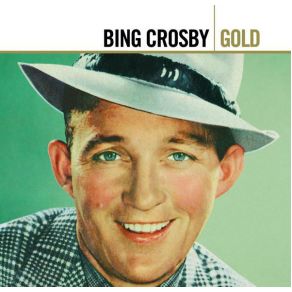Gold: Bing Crosby
Download links and information about Gold: Bing Crosby by Bing Crosby. This album was released in 2008 and it belongs to Jazz, Vocal Jazz, Pop genres. It contains 40 tracks with total duration of 01:59:39 minutes.

|
|
|---|---|
| Artist: | Bing Crosby |
| Release date: | 2008 |
| Genre: | Jazz, Vocal Jazz, Pop |
| Tracks: | 40 |
| Duration: | 01:59:39 |
| Buy it NOW at: | |
| Buy on iTunes $15.99 | |
Tracks
[Edit]| No. | Title | Length |
|---|---|---|
| 1. | Out of Nowhere (1931 Single) | 3:06 |
| 2. | Just One More Chance (1931 Single) | 3:27 |
| 3. | At Your Command | 3:17 |
| 4. | Where the Blue of the Night (Meets the Gold of the Day) [1932 Single] | 2:59 |
| 5. | Love In Bloom | 3:09 |
| 6. | The Very Thought of You | 2:56 |
| 7. | June In January | 3:11 |
| 8. | Soon | 3:02 |
| 9. | It's Easy to Remember (featuring The Rhythmettes, Georgie Stoll) | 3:09 |
| 10. | Red Sails In the Sunset (featuring Victor Young) | 3:11 |
| 11. | Pennies from Heaven | 3:09 |
| 12. | Sweet Leilani | 3:16 |
| 13. | Too Marvelous for Words (featuring Jimmy Dorsey, Jimmy Dorsey And His Orchestra) | 3:02 |
| 14. | The Moon Got In My Eyes | 3:09 |
| 15. | Remember Me? (featuring John Scott Trotter) | 2:59 |
| 16. | Bob White (Whatcha Gonna Swing Tonight?) (featuring John Scott Trotter) | 2:35 |
| 17. | I've Got a Pocketful of Dreams (featuring John Scott Trotter) | 2:35 |
| 18. | You Must Have Been a Beautiful Baby | 2:54 |
| 19. | Sierra Sue (featuring John Scott Trotter) | 2:59 |
| 20. | Trade Winds (featuring Dick McIntire) | 3:13 |
| 21. | Only Forever (featuring John Scott Trotter) | 3:09 |
| 22. | Please (1940 Single) (featuring John Scott Trotter) | 3:01 |
| 23. | White Christmas (1942 Holiday Inn Version) | 2:59 |
| 24. | Moonlight Becomes You (featuring John Scott Trotter) | 3:10 |
| 25. | Sunday, Monday or Always | 2:32 |
| 26. | San Fernando Valley (featuring John Scott Trotter) | 3:11 |
| 27. | Swinging On a Star | 2:29 |
| 28. | I Love You (1944 Single) (featuring John Scott Trotter) | 2:34 |
| 29. | I'll Be Seeing You (1993 Box Set Version) (featuring John Scott Trotter) | 2:47 |
| 30. | Don't Fence Me In (featuring Andrews Sisters, The) | 3:03 |
| 31. | It's Been a Long, Long Time | 2:56 |
| 32. | Too-Ra-Loo-Ra-Loo-Ral (That's an Irish Lullaby) [1945 Single] (featuring John Scott Trotter) | 3:17 |
| 33. | I Can't Begin to Tell You | 2:51 |
| 34. | Alexander's Ragtime Band (featuring Morris Stoloff, Al Jolson) | 2:57 |
| 35. | Now Is the Hour (Maori Farewell Song) | 3:06 |
| 36. | Far Away Places | 2:57 |
| 37. | Dear Hearts and Gentle People | 2:38 |
| 38. | Play a Simple Melody (featuring Gary Crosby) | 2:52 |
| 39. | Gone Fishin' (featuring Louis Armstrong) | 2:29 |
| 40. | In the Cool, Cool, Cool of the Evening (featuring Jane Wyman, Miss A, Four Hits) | 3:23 |
Details
[Edit]In his self-published book Bing Crosby's Commercial Recordings: From 78s to CDs, Crosby scholar F.B. Wiggins provides a list of "Bing's 40 Top Hits." Wiggins is also the compiler of this 40-track hits compilation, and unsurprisingly 32 of its selections are included on that list, plus two songs in different versions from the ones on the list. Wiggins' primary deviation from his list is forced upon him — there are six tracks from the period 1931-1934 that are not owned by Universal Music and thus not available for a compilation on its Geffen imprint. One of them is "Please," for which Wiggins substitutes a 1940 re-recording. But he also takes the opportunity to augment this roughly chronological sequence of chart-toppers with some signature tunes, such as "When the Blue of the Night Meets the Gold of the Day," Crosby's radio theme song; "Too-Ra-Loo-Ra-Loo-Ral," an excellent example of his way with an Irish number, and early-'50s collaborations with Louis Armstrong ("Gone Fishin'") and Jane Wyman ("In the Cool, Cool, Cool of the Evening"). These are some of the liveliest performances on the album. Indeed, Crosby always seems to be stimulated by a collaborator, whether it's Connee Boswell ("Bob White") or the Andrews Sisters ("Don't Fence Me In"). Perhaps supposing that one meeting with Boswell was enough, Wiggins drops their 1938 version of "Alexander's Ragtime Band" (included on his list of top hits) in favor of a 1947 one with Al Jolson. Still, the heart of this collection is the series of major hits Crosby scored in a variety of styles over a period of 20 years, as he excelled whether singing straight ballads, rhythm numbers, country & western-flavored material, Dixieland, or even Hawaiian songs. (In fact, he showed a particular affinity for music from the islands.) By Wiggins' count, Crosby made 2,000 studio recordings for commercial release over 52 years. This album contains only 40 of them from the two-decade height of his popularity. But it gives a good sense of what the rest were like and why Crosby was such a dominant singer in his era.